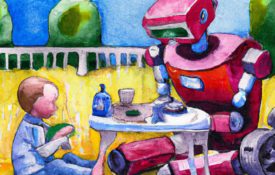-

Special Episode I: APS 2023 Spence Awardees on Fresh Starts, Time Perception, and the Well-being of Black Families
Riana Elyse Anderson, Ed O’Brien, and Hengchen Dai discuss how to study and improve the well-being and functioning of Black families, the importance of time in how people perceive progress, and how fresh starts can feel motivating. Visit Page
-

Is Cheating Just a Symptom (and Not the Cause) of Declining Relationships?
Podcast: Researchers found that relationship functioning starts to decline before infidelity happens. The lead author of this study, Olga Stavrova, explains these findings Visit Page
-

Stop Oversimplifying Mental Health Diagnoses
Podcast: Diagnoses often oversimplify complex mental health problems. APS Fellow Eiko Fried, a psychologist and methodologist at Leiden University, explains new approaches to mental health research and practice. Visit Page
-

Top 10 Articles of 2022: Opinionated Fetuses! Cheating Spouses! And Much More
Podcast: Do fetuses care what their mothers eat? When do spouses cheat? Some of the top articles published in the APS journals in 2022 explored these questions and much more. Visit Page
-

A Very Human Answer to One of AI’s Deepest Dilemmas
Imagine that we designed a fully intelligent, autonomous robot that acted on the world to accomplish its goals. How could we make sure that it would want the same things we do? Alison Gopnik explores. Read or listen! Visit Page
-

What You Know Changes What and How You See
Can what we know about an object change the way we see it? Dick Dubbelde speaks about how quickly and how well we process different objects. Visit Page

